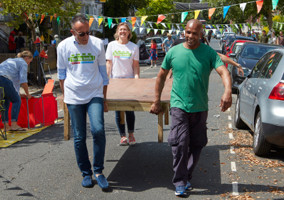As we hurl ourselves headlong toward 31 October, it’s easy to assume that the popular desire for more control that is now commonly and forcibly expressed by many people in this country is only about the EU, or an increasingly dysfunctional Parliament. But it isn’t. It’s everywhere. In different ways, different guises. The need to be listened to, to feel more in control, has been growing for a very, very long time. Well before our fated referendum.
The need for people to be listened to is visible everywhere and has been growing for a very long time. ‘Wanting to be in control’ has taken on many different guises but, at its heart, it is the twin expression of loss of control over your life and being served poorly by things and the people who have control and influence over you.
And while our eyes are wide and intently focused on what might be the rawest and most significant event to affect our country in living memory, that desire for control is driving a lot of policy and practice outside politics too, in the realm of civil society and those who resource it.
This is important. Because in the gaps outside work, outside politics, outside shopping and Netflix, in that empty, ungoverned space of un-coerced association – in our communities in other words – is where we are finding a sense of control, mutual support and the capacity to transform. Public institutions need to find ways of working with that power, involving communities in ways which shift their policies and practice.
Putting people in the lead
Many who fund and resource communities and civil society have an enormously influencing guiding hand in this phenomenon. The National Lottery Community Fund has an express funding strategy for putting people in the lead. Similarly, the Local Trust’s ‘Big Local’ programme expressly set out to place £150m directly in the hands of 150 communities across England -- areas that historically have been under-served by funding and investment.
Other charitable foundations are experimenting with different ways of bringing people, end users and beneficiaries into different decision-making processes, such as involving people and communities in deciding how grants are awarded. We’ve seen experiments in participatory budgeting in different local authorities across the UK; a precursor perhaps for much more devolution of power and control to a community level. Think tanks are plotting the nascent trend towards “community commissioning” which would “take budgets currently controlled by public services and transfer them to the control of organisations formed directly by service users or members of the local community”.
The recent framework published by the Ministry of Housing, Communities and Local Government is advocating for community involvement in all departmental policies. And the vast majority of our Young Foundation work is expressly focused on community involvement and empowerment, building confidence, capability and skills to tackle issues people care about.
Driven by different factors
This emerging, structural shift towards greater community involvement and empowerment is being driven by a number of different factors. It’s been proven time and again that involving users in the design of public services can lead to services that better meet people’s underlying needs, requiring something beyond service delivery.
We have social and health challenges which are intimately bound up in behaviours, habits and routines, which are stubbornly difficult for technocrats to shift. Austerity, felt so unevenly across the country, means that communities are being looked to in often quite instrumental ways to create public value or solve social problems that are a result of - or exacerbated by - cuts to government funding.
We see a rising number of instances where communities have taken it upon themselves to sort out a local problem, increasingly through communities taking on ownership of local assets (like parks, cafes, community centres, pools), with endowed foundations like Power to Change as the engine of those ambitions.
And if Thomas Carlyle was right to say “invent the printing press and democracy is inevitable” then mass adoption of social media and digital communications is driving demand not just for a different kind of politics, but for greater involvement and participation with all sources of power wherever they are found, from hyper local to global.
This has profound implications. Particularly if those demands are ignored, and find their thwarted expression through new, populist leaders, who will emerge as readily outside the walls of Parliament as within.
Term “left behind” is misleading
Anyone working from a seat of power, in whatever sector, needs to find ways of understanding their role in supporting communities to thrive. The term ‘left behind’ places is trotted out on a daily basis, but it is misleading. There is a disproportionate amount of community strength, identity and resilience in these ‘left behind’ places. Sustained social change is seeded in the grassroots.
These places are not left behind, but they are under-estimated. Understanding how to listen, respect and shift resource flows toward them is the task of anyone hoping for a more equal, less polarised society.
The Institute for Community Studies launches on 15 October at Rix Mix Cinema, Bethnal Green
Helen Goulden is chief executive of the Young Foundation, which is hosting the Institute for Community Studies
Related articles












